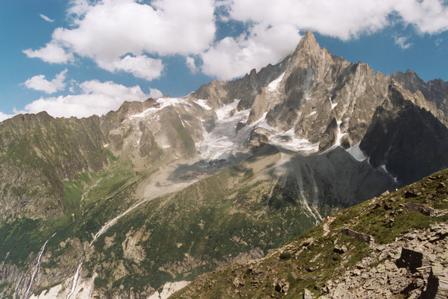Trees and shrubs are expected to face many threats due to the increase in heat compared to plants that find it easier to climb up the mountain to reach the optimal temperatures. This is according to a study conducted in France and published in the journal Science

Climate change has caused plants to seek cooler conditions at higher altitudes. This is according to a study of 171 forest plant species in the mountains of Western Europe published this weekend in the journal Science. The plants climbed an average of 29 meters each decade. The research also shows that smaller species such as ferns, whose reproductive cycle is shorter, were the first to change location.
"This is the first time that climate change has been shown to have an effect on plant species living in a wide range of temperatures over the last century," explains Jonathan Lenoir, the project's lead researcher. Prof. Lenoir, an ecologist at Agro-Paris-Tech in France, said that his team wanted to find out whether the fingerprint of climate change is already evident in normal ecosystems, and not as measured so far in extreme environments.
To do this, team members from France and Chile compared the distribution of woodland species between 1905 and 1985 and their distribution between 1986 and 2005. The work was made possible thanks to a long-term database that documented the presence of forest plant species since 1905, he explained.
"We used 171 plant species common in the mountains of France, which are part of the Mediterranean region. And we tested the temperatures and the ecological environment between sea level and 2,600 meters above them. We found significant changes in the altitudinal distribution of these species towards areas 29 meters higher each decade. Of these 171 species, most of the upward movement caused them to remain in the same temperature regime that is optimal for their development and reproduction."
Jean-Claude Gago, also a co-author of the study, said that the different species of plants show different reactions to temperature changes. Long-lived plants such as trees and shrubs showed no significant shift while short-lived creatures such as ferns rose rapidly. "Weeds with a short life cycle were able to have several generations per decade and this allowed them to disperse their seeds more quickly. In contrast, the trees, which had only one or two generations during that period, were impaired in their ability to follow climate changes.
Prof. Gago said that in his opinion, long-lived plants - especially trees - are more threatened by climate change than the grass species. This may cause significant changes in the composition and structure of the plant communities and the living organisms that depend on them. added The researchers conclude and say that additional studies are needed to understand the full force of the changes and to assess the effect of warming on the ecosystems in the long term.

4 תגובות
Two plants (and perhaps more) from the mountains of Europe, with a fragmented distribution, probably became extinct due to climatic warming and drying since the Ice Age about ten thousand years ago, from the mountains of the Land of Israel: 1. Pinguicula alpina, a carnivorous plant from the family of the Nenadidae - which appears in the mountains of western, central Europe and the eastern ones and after a break appears in the Himalayan mountains: northern India, Tibet, Nepal and Burma latitude 29 degrees south of the mountains of Israel! 2. Spring gentian (gentiana verna) from the Arabian family - the plant, which grows in the mountains of Europe, is also found in the mountains of northern Iran and Iraq and also appears in the mountains Turkey, after a geographical break, the plant reappears in the High Atlas Mountains in Morocco at a latitude of 32 degrees, just like Israel, which is at a latitude of 32-33 degrees. The first plant has white-yellow flowers, while the second has deep blue flowers (gentian) and is considered a "plant king" The Alps."
Where do you sell land on a mountain? 🙂
The waters of the rising oceans will not reach there.
Plants will climb there from generation to generation.
Move to the Alps or the Himalayas? Or will Jerusalem be enough?